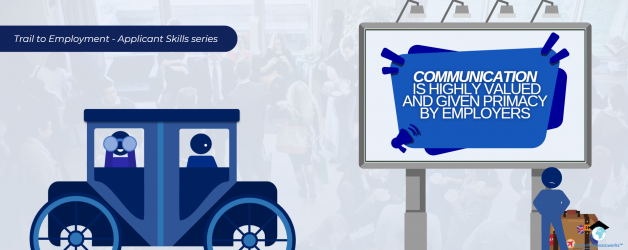Trail To Employment – Applicant Skills Series
“I speak, therefore I am” – but does an employer who is hiring candidates think this too? Written and verbal communication are the means through which we connect. The Erasmus Competence Booklet introduces communication as the bond between a speaker and their audience, or a writer to their reader. Improving your communication is not just being concrete, concise and clear, but knowing who the recipient is. But be aware, the form of your message depends on who it is intended to reach, the target group.
Oral communication often starts as a simple exchange of information, which helps to avoid misunderstandings. You can upgrade your oral skills with active listening, ultimately resulting in inspiring and motivating others. Written communication tends to be more formal, such as emails and reports. Written assignments and extracurricular activities, like writing an article for the university’s newspaper, are conducive to your preparation for such tasks. In this process, you learn to select essential information, structure it, and present it straightforwardly and interestingly. In doing so, you lay the groundwork for your eventual CVs or cover letters.
Communication skills are immediately put to use when you enter the workforce. Effective communication not only ensures a smooth expression of directions and policies; it also plays a critical role in fostering creativity. Your ability to convey your most creative ideas in a non-complicated scheme can save companies valuable time, and attract the attention a well-articulated proposal deserves. As the CICan Innovation Fund Project Report outlines, effective communication establishes respectful interactions among students from different backgrounds and builds healthy relationships in the workplace.
If you choose to become an internationally mobile student, you will enjoy the opportunity to polish your communication skills abroad. A transformative benefit of going on exchange is being introduced to a new communication system. You suddenly start receiving information in the form the host country uses and are expected to make sense of it. Simultaneously, you will learn how to re-phrase and adjust your thoughts to ensure comprehension of the host country. University curricula further offer communication-oriented activities, popular among which are public speaking debates. Additionally, a variety of communication-building opportunities are held by student societies and study associations, who create their own writing clubs or radio stations, fostering the art of proper word choice.
Communication; Adaptability; Problem-solving; Teamwork; and Time- and Self-management are the top skills employers seek. These skills surfaced in the employer interviews conducted by Expertise in Labour Mobility (ELM) within the CICan Innovation Fund Project. This blog series called Trail to Employment – Applicant Skills presents each of their respective functions using the metaphor of a carriage, the vehicle needed on the trail to employment. In doing so, we direct students considering going to an exchange or approaching graduation on their path to the job market. The series concludes with a post proposing different ways you can convincingly argue how your international experience contributed to the acquisition and cultivation of those skills.
In summary, Communication is highly valued and given primacy by employers. Communication within the carriage is the body – the very transferring unit that takes you from application to recruitment. If you are interested in learning about the rest of the top five skills, click on the next post!
Written by Athina Tzanetou for Expertise in Labour Mobility
Images by Jizelle Ys for CareerProfessor.works
© 2024 CareerProfessor.works. All Rights Reserved.






